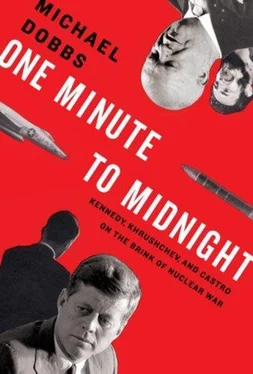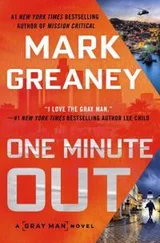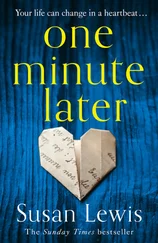McNamara was less concerned about the precise location of different ships than the question of how the naval “quarantine” should be enforced. The Navy interpreted the notion of a blockade literally: banned weapons would not be allowed through. McNamara and Kennedy viewed it more as a mechanism for sending political messages to the rival superpower. The objective was to get Khrushchev to back down, not to sink Soviet ships. The defense secretary peppered the chief of naval operations with questions about how the Navy would stop the first ship to cross the quarantine line.
“We’ll hail it.”
“In what language—English or Russian?”
“How the hell do I know?”
“What will you do if they don’t understand?”
“I suppose we’ll use flags.”
“Well, what if they don’t stop?”
“We’ll send a shot across the bow.”
“What if that doesn’t work?”
“Then we’ll fire into the rudder.”
“You’re not going to fire a single shot at anything without my express permission. Is that clear?”
Earlier that afternoon, Anderson had drawn the attention of his commanders to a manual published in 1955, Law of Naval Warfare, that described procedures for boarding and searching enemy warships. He picked up a copy of the cardboard-covered booklet and waved it in McNamara’s face. “It’s all in there, Mr. Secretary,” he told his boss. The manual authorized the “destruction” of warships “actively resisting search or capture.”
As Gilpatric later remembered the episode, Anderson could barely contain his anger as he listened to McNamara’s detailed questions. “This is none of your goddamn business,” he finally exploded. “We know how to do this. We’ve been doing it ever since the days of John Paul Jones, and if you’ll just go back to your quarters, Mr. Secretary, we’ll take care of this.”
Gilpatric could see the color rising in his boss’s countenance. For a moment, he feared a blazing row in front of the assembled Navy brass. But McNamara simply remarked, “You heard me, Admiral, there will be no shots fired without my permission,” and walked out of the room.
“That’s the end of Anderson,” he told Gilpatric as they walked back to their adjoining office suites. “As far as I’m concerned, he’s lost my confidence.”
The clash between the secretary of defense and the chief of naval operations would come to epitomize a much larger struggle for influence between civilians and the uniformed military. The story has been retold so frequently that it has become encrusted with myth. Most accounts of the missile crisis claim, for example, that the confrontation took place on Wednesday evening rather than Tuesday evening —after the quarantine had already come into effect. But a study of Pentagon diaries and other records demonstrates that this is impossible. Anderson was not even in the building on Wednesday evening at the time he is alleged to have had his acrimonious encounter with McNamara.
9:30 P.M. TUESDAY, OCTOBER 23
On the other side of the Potomac, an agitated Bobby Kennedy appeared at the gate of the Soviet Embassy on Sixteenth Street, NW, just as McNamara was leaving Intelligence Plot. He was met by Anatoly Dobrynin, who escorted him to his apartment on the third floor of the grandiose, turn-of-the-century mansion built by the widow of railcar magnate George Pullman. Dobrynin sat him down in the living room and offered him a cup of coffee.
The president felt personally betrayed by the Soviets, Bobby told the ambassador. He had believed Khrushchev’s assurances about the absence of offensive missiles on Cuba, but had been deceived. This had “devastating implications for the peace of the world.” As an afterthought, RFK added that his brother was under heavy attack from Republicans and had “staked his political career” on the Soviet assurances. Dobrynin had difficulty replying as he too had been kept in the dark by Moscow. He gamely insisted that the American information must be wrong.
As the ambassador was escorting him back to his car, Bobby asked what instructions had been given to the captains of Soviet ships. Dobrynin replied that, as far as he knew, they were under orders to ignore “unlawful demands to stop or be searched on the open sea.”
“I don’t know how this is going to end,” said RFK, as they bade each other good-bye, “but we intend to stop your ships.”
“That would be an act of war,” protested the ambassador.
9:35 P.M. TUESDAY, OCTOBER 23 (8:35 P.M. HAVANA)
Eleven hundred miles away, in Havana, a convoy of government vehicles had just pulled up outside a television studio in the exclusive Vedado section of town. Fidel Castro jumped out of a jeep in his trademark olive green fatigues, followed by ministers in military uniform. A red-and-black diamond on his shoulder epaulettes identified him as a comandante, a major, the highest rank in the Cuban army. Like JFK the previous night, Castro planned to use television to deliver one of the most important speeches of his life and prepare his people for the difficult days ahead.
Television was as important to Castro as it was to Kennedy. It was a very personal medium, enabling Cubans to know him as “Fidel” rather than “Castro.” He was not just the commander in chief; he was the professor in chief, constantly teaching, cajoling, explaining. The number of televisions per capita was low in Cuba compared to the United States, but high compared to Latin America. If one person in a neighborhood had a television set, everybody would crowd around to watch Fidel.
The mass media had always been critical to Castro’s success as a revolutionary leader. As a young man, he had listened entranced to the weekly speeches of a fiery radical named Eddy Chibas who used the radio to denounce corruption and injustice. During the war against Batista, he set up a small transmitter in the mountains known as “Radio Rebelde” to drum up support for the revolution. He used an interview with Herbert Matthews of The New York Times to disprove government claims that he was dead. Virtually every step of Fidel’s victorious five-day march across Cuba after Batista’s hurried departure was shown on live television, culminating in his triumphant entry into Havana on January 8, 1959.
Like Kennedy, Castro was not a born public speaker. Both men had to overcome some initial shyness in order to find their voice. When he first ran for Congress in 1946, Kennedy would practice his speeches many times over in private until he gradually became more relaxed. Castro felt so uncomfortable in public that he had to consciously wind himself up into a lather of indignation. Some observers felt that his legendary loquacity—he often spoke for five or six hours at a stretch—was connected to his shyness. “Fatigued by talking, he rests by talking,” the Colombian writer Gabriel Garcia Marquez would later observe of Fidel. “When he starts speaking, his voice is always hard to hear and his course is uncertain, but he takes advantage of anything to gain ground, little by little, until he takes possession of his audience.” Having made the huge mental effort to begin speaking, Castro found it difficult to stop.
After a brief introduction from a sycophantic “interviewer,” he launched into a tirade against Kennedy and the United States. The speech was the usual hodgepodge of indignation, soaring oratory, long rambling asides, biting sarcasm, and the occasional non sequitur. He used his Jesuit training to dissect Kennedy’s speech point by point, barely pausing for breath as he jumped directly from his “second point” to his “fourth point” with no mention of the “third point.”
Kennedy’s expressions of sympathy with “the captive people of Cuba” were grist to Castro’s rhetorical mill. “He is talking about a people that has hundreds of thousands of men under arms. He should have said the armed captive people of Cuba.”
Читать дальше












